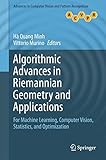Algorithmic Advances in Riemannian Geometry and Applications [electronic resource] : For Machine Learning, Computer Vision, Statistics, and Optimization / edited by H�a Quang Minh, Vittorio Murino.
Contributor(s): Minh, H�a Quang [editor.] | Murino, Vittorio [editor.] | SpringerLink (Online service).
Material type: BookSeries: Advances in Computer Vision and Pattern Recognition: Publisher: Cham : Springer International Publishing : Imprint: Springer, 2016Description: XIV, 208 p. 55 illus., 51 illus. in color. online resource.Content type: text Media type: computer Carrier type: online resourceISBN: 9783319450261.Subject(s): Computer science | Mathematical statistics | Artificial intelligence | Pattern recognition | Computer science -- Mathematics | Computer mathematics | Statistics | Computational intelligence | Computer Science | Pattern Recognition | Computational Intelligence | Statistics and Computing/Statistics Programs | Mathematical Applications in Computer Science | Artificial Intelligence (incl. Robotics) | Probability and Statistics in Computer ScienceAdditional physical formats: Printed edition:: No titleDDC classification: 006.4 Online resources: Click here to access online
In:
Springer eBooksSummary: This book presents a selection of the most recent algorithmic advances in Riemannian geometry in the context of machine learning, statistics, optimization, computer vision, and related fields. The unifying theme of the different chapters in the book is the exploitation of the geometry of data using the mathematical machinery of Riemannian geometry. As demonstrated by all the chapters in the book, when the data is intrinsically non-Euclidean, the utilization of this geometrical information can lead to better algorithms that can capture more accurately the structures inherent in the data, leading ultimately to better empirical performance. This book is not intended to be an encyclopedic compilation of the applications of Riemannian geometry. Instead, it focuses on several important research directions that are currently actively pursued by researchers in the field. These include statistical modeling and analysis on manifolds,optimization on manifolds, Riemannian manifolds and kernel methods, and dictionary learning and sparse coding on manifolds. Examples of applications include novel algorithms for Monte Carlo sampling and Gaussian Mixture Model fitting,  3D brain image analysis,image classification, action recognition, and motion tracking.
BookSeries: Advances in Computer Vision and Pattern Recognition: Publisher: Cham : Springer International Publishing : Imprint: Springer, 2016Description: XIV, 208 p. 55 illus., 51 illus. in color. online resource.Content type: text Media type: computer Carrier type: online resourceISBN: 9783319450261.Subject(s): Computer science | Mathematical statistics | Artificial intelligence | Pattern recognition | Computer science -- Mathematics | Computer mathematics | Statistics | Computational intelligence | Computer Science | Pattern Recognition | Computational Intelligence | Statistics and Computing/Statistics Programs | Mathematical Applications in Computer Science | Artificial Intelligence (incl. Robotics) | Probability and Statistics in Computer ScienceAdditional physical formats: Printed edition:: No titleDDC classification: 006.4 Online resources: Click here to access online
In:
Springer eBooksSummary: This book presents a selection of the most recent algorithmic advances in Riemannian geometry in the context of machine learning, statistics, optimization, computer vision, and related fields. The unifying theme of the different chapters in the book is the exploitation of the geometry of data using the mathematical machinery of Riemannian geometry. As demonstrated by all the chapters in the book, when the data is intrinsically non-Euclidean, the utilization of this geometrical information can lead to better algorithms that can capture more accurately the structures inherent in the data, leading ultimately to better empirical performance. This book is not intended to be an encyclopedic compilation of the applications of Riemannian geometry. Instead, it focuses on several important research directions that are currently actively pursued by researchers in the field. These include statistical modeling and analysis on manifolds,optimization on manifolds, Riemannian manifolds and kernel methods, and dictionary learning and sparse coding on manifolds. Examples of applications include novel algorithms for Monte Carlo sampling and Gaussian Mixture Model fitting,  3D brain image analysis,image classification, action recognition, and motion tracking.
This book presents a selection of the most recent algorithmic advances in Riemannian geometry in the context of machine learning, statistics, optimization, computer vision, and related fields. The unifying theme of the different chapters in the book is the exploitation of the geometry of data using the mathematical machinery of Riemannian geometry. As demonstrated by all the chapters in the book, when the data is intrinsically non-Euclidean, the utilization of this geometrical information can lead to better algorithms that can capture more accurately the structures inherent in the data, leading ultimately to better empirical performance. This book is not intended to be an encyclopedic compilation of the applications of Riemannian geometry. Instead, it focuses on several important research directions that are currently actively pursued by researchers in the field. These include statistical modeling and analysis on manifolds,optimization on manifolds, Riemannian manifolds and kernel methods, and dictionary learning and sparse coding on manifolds. Examples of applications include novel algorithms for Monte Carlo sampling and Gaussian Mixture Model fitting,  3D brain image analysis,image classification, action recognition, and motion tracking.


There are no comments for this item.